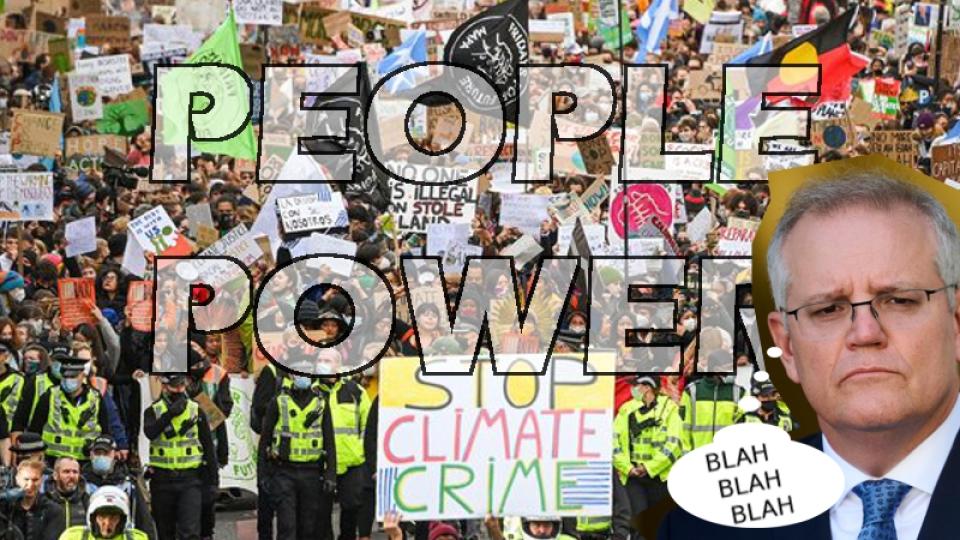Can-do people power can save the planet

For the government of a country committed to expanding the exploitation of fossil fuels and stopping meaningful action on climate change, it was entirely fitting that the Australian stand at the COP26 conference venue in Glasgow was sponsored by Santos.
At its 2017 AGM, Santos chairperson Peter Coates declared that preparing for 4°C of warming was “sensible”.
Such a temperature increase would cause the majority of life to become extinct and wipe out human civilisation in the most violent and traumatic event in our own species’ short history. Of course, some sort of life would emerge from the wreckage to repopulate Earth — but possibly not us.
It is pretty clear now that Australia is ruled by, and on behalf of, sociopaths who are confident that they, or their children, will get a place on the escape space shuttle out of here if things turn to shit.
After being forced to attend the United Nations Climate conference, Prime Minister Scott Morrison tried to turn a negative into a positive by claiming that both he and big business had a better plan to solve the crisis than everyone else present. (He’s becoming more and more like Donald Trump on that score.)
Morrison then treated us to his meaningless drivel, including that “Can-do capitalism, not don’t-do governments” would solve the problem and that COP 26 marked a “passing of the baton” from government to business.
Labor’s criticisms were predictably timid. They don’t have much room to move given they also support more coal and gas mining, coupled with public subsidies to the fossil fuel companies.
The Coalition and Labor agree that Australia gets a special leave pass that no one else is entitled to. Even if climate change is real and presents an existential threat to life on Earth, Australia’s capitalists should be allowed to continue to make profits from fossil fuels and stopping warming is everyone else’s responsibility.
Morrison and Albanese are so bad on climate policy that now Greens leader Adam Bandt has the political space to claim the mantle as the sensible counterpart to United States President Joe Biden and British Prime Minister Boris Johnson.
Bandt said on November 15: “The next election will be a climate fight and the heat is now on Liberal and Labor to stop their push for more coal and gas and lift 2030 targets to 75% to keep 1.5 alive … Only the Greens’ policies are in line with Glasgow.”
While that last sentence is true, there are two fundamental problems with his pitch.
First, the agreements secured at Glasgow fall well short of what is needed to ensure a safe climate. To have a good chance of stopping the 2°C overshoot, we need to be at net zero by 2030 and so the existing pledges are inadequate anyway.
As David Spratt explained at Climate Code Red: “Glasgow will not get within a mile of pledges to halve emissions by 2030 and any reputable climate scientist will say that means warming is going to shoot past 2°C. That then gets us into the land of accelerating carbon-cycle feedbacks of such magnitude that another degree becomes likely.”
The second problem with Bandt’s pitch is that by portraying Biden and Johnson as leaders who are taking the challenge seriously, credence is given to the notion that “green capitalism” coupled with carbon trading schemes can do the job.
The problem is not just “fossil fuel capitalism,” but capitalism itself. That’s because it is based on endless growth and, to maximise profits, the externalisation of the true costs of production on to society and the environment.
In her no-nonsense style, climate leader Greta Thunberg rejected the fantasy of green capitalism in a speech to the November 5 student strike in Glasgow,
“Are we fighting to save ourselves and the living planet? Or are we fighting to maintain business as usual? Our leaders say we can have both, but the harsh truth is that that is not possible in practice.
“The people in power can continue to live in their bubble, filled with fantasies like eternal growth on a finite planet, and technological solutions that will suddenly appear, seemingly out of nowhere, and will erase all of these crises, just like that.”
While new technology is important, alone it will simply not be able to deliver the rapid cuts in emissions we need.
We need to fundamentally restructure the economy to serve social and ecological well-being. For that to be possible, we need to bring large monopolised sections of the economy into democratic community ownership. That’s no small thing; it will mean breaking the back of big business.
To do that we will need unions, students, churches, climate action groups and more to mobilise on a scale we’ve never seen in this country before. Glasgow was a cop out, and life on Earth depends on us standing up for it.
[Sam Wainwright is a national co-convenor of Socialist Alliance.]